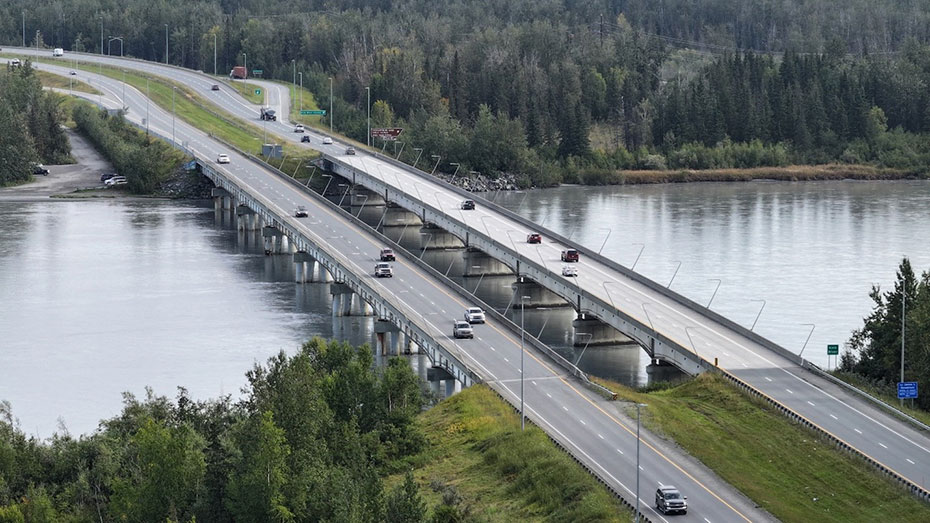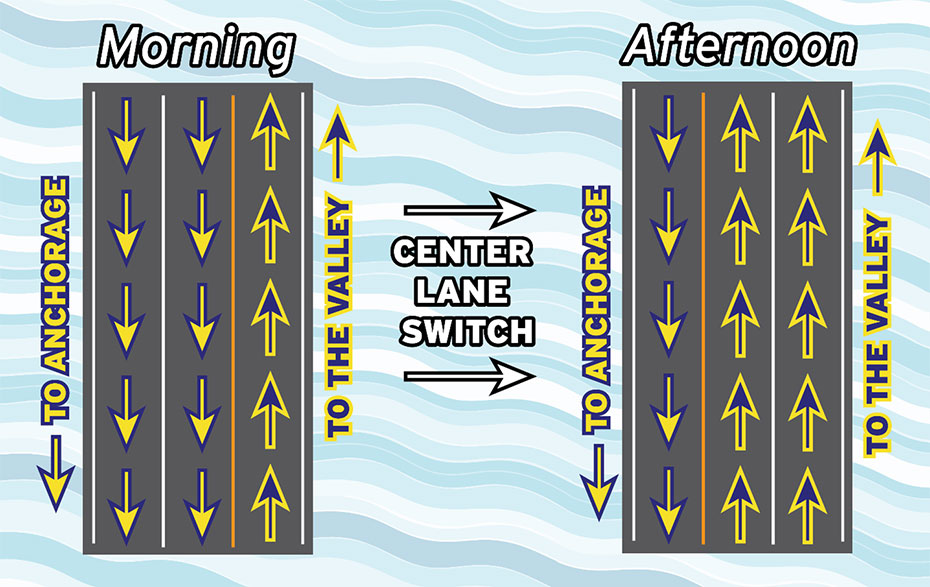Glenn Highway Bridge Deck Preservation
State/Federal Project No: CFHWY00523/0001685
We are working to rehabilitate three bridges along the Glenn Highway: the northbound and southbound Knik River bridges, just south of the Glenn/Parks interchange, and the northbound Peters Creek bridge near Chugiak. All three of these bridges are over 30 years old, and two are almost 60 years old (the northbound Knik River bridge and northbound Peters Creek Bridge were both constructed in the 1960s). The bridges have potholes, ruts, and other maintenance issues that need to be repaired. The purpose of this work is to extend the service lives of the bridges, reduce maintenance costs, and enhance safety.
Work on this project will include the following:
- Repairing potholes in the concrete decks
- Installing polyester concrete overlay to waterproof the bridges and reduce corrosion
- Replacing the approach slabs to improve the driving surface
- Replacing the expansion joints, damaged drainage hardware, and guardrail as needed
- Upgrading signs and pavement markings
- Working on utilities as needed

Figure 1. An aerial photo of the Knik River bridges. Photo credit Jonathan Tymick, DOT&PF.
How will this impact me?
Work at the Knik River bridges started in 2024 and is expected to be complete before the Alaska State Fair in 2025. The northbound Peters Creek bridge will be under construction in 2025 and 2026. Continue to check 511.alaska.gov for the most up to date traffic impacts.
2025 WORK AT KNIK RIVER BRIDGES
We closed each Knik River bridge for 30 days while we rehabilitated them. The first bridge closed in late April, and the second bridge was closed in June. When one bridge was closed the other remained open at a reduced speed limit to three lanes of traffic, two in one direction and one in the other. There were two lanes of southbound traffic open during the morning rush to Anchorage. Crews then shifted the median with the Road Zipper and opened two lanes of northbound traffic during the afternoon rush back to the Mat-Su Valley. On Saturdays there were two lanes headed to the Mat-Su Valley and on Sundays there were two lanes headed to Anchorage. Once both bridges are reopened crews will apply a final polyester concrete overlay and remove the temporary detours.
2025/2026 WORK AT PETERS CREEK BRIDGE
Crews will start work at the Peters Creek Bridge in July 2025. Crews will build a temporary crossover detour in preparation for the substantial bridge work in 2026. The northbound Peters Creek Bridge will close for 45 days in the spring of 2026. During this time, all traffic will be on the open bridge, and we will employ the same alternating lane technique described above that we used on the Knik River Bridges. After the bridge reopens crews will apply the final polyester concrete overlay.
2025 Construction Schedule:
-
April 7 - Crews arrived on site and started mobilizing equipment and setting up signs.
-
The week of April 14 - A 45 MPH speed restriction was put in place for preliminary paving activities and some rumble strip removal. Crews re-striped the southbound bridge for the new lane configuration and started assembling the concrete barriers. The speed restriction will last through the summer.
-
April 23 - The northbound bridge CLOSED. The northbound on-ramp from the Old Glenn Highway to the Glenn Highway, the northbound off-ramp from the Glenn Highway to Knik River Access Road, and the southbound on-ramp from the Knik River Access Road to the Glenn Highway also CLOSED starting April 23.
-
May 22 - The northbound bridge reopened.
-
June 2- The southbound bridge CLOSED for 30 days. The southbound on-ramp from Reflections Lake to the Glenn Highway was also CLOSED during this time.
-
Late June or Early July– Reopen the southbound Knik River bridge (weather dependent). The Road Zipper machine will go into storage until next year.
-
July – Apply polyester concrete overlay on Knik River Bridges. Start removing the temporary crossover detours at Knik River Bridges.
-
July – Start constructing temporary crossover detours at the Peters Creek Bridge.
-
Construction on both Knik River Bridges is anticipated to be complete before the Alaska State Fair in August.
2026 Construction Schedule:
-
Spring 2026 – The northbound Peters Creek Bridge will be CLOSED for 45 days. The Road Zipper machine will come out of storage.
-
By Memorial Day – Northbound Peter's Creek Bridge is reopened.
Let us know how we're doing!
Take a quick 5-minute survey about this project. Let us know how you prefer to learn about construction updates, what we're doing well, and what we could improve on. You can take the survey at this link

Figure 2. Three lanes of traffic will be maintained on the open bridge and the middle lane will alternate directions depending on the time of day.
During this construction drivers are encouraged to utilize the full length of all open lanes through a merging technique called the "zipper merge." Drivers remain in both open lanes of traffic until one comes to an end. Drivers in the lane that is ending use their turn signal and take turns merging into the open lane. Drivers in the open lane must consistently let drivers in the other lane merge into their lane. When correctly done, zipper merging can reduce congestion by up to 40%.

Figure 3. A graphic example of how to zipper merge.
Check out this video from our colleagues at the Utah Department of Transportation for a video demonstrating the zipper merge:
Timeline
-
2024 – Crews constructed temporary detours at the Knik River Bridges.
-
2025 – Work on the Knik River Bridges is expected to be complete before the Alaska State Fair in August. Crews will start preliminary work at the Peters Creek Bridge in July.
-
2026 – We expect to close the northbound Peters Creek Bridge for 45 days and reopen it before Memorial Day. Final work applying the polyester concrete overlay will be finished once the bridge is open.
New construction equipment comes to Alaska!
You might be wondering how we're going to move the concrete medians separating traffic every day and allow the middle lane of traffic to alternate directions. Enter the Road Zipper! This machine drives down the median, picks up the heavy concrete dividers and sets them down in their new position. This will allow the crews to shift the median along the 1,532-foot-long bridges twice a day in as little as 15 minutes!
Check out this video of a Road Zipper in action:
The Sergeant James Bondsteel Bridge of Honor
The northbound Knik River bridge is named after Sergeant James Bondsteel, a recipient of the U.S. Medal of Honor. Born in Michigan, Sergeant Bondsteel served with the U.S. Marine Corps in Korea and then with the U.S. Army in Vietnam. His actions during the 1969 Battle of Anloc in Vietnam earned him the Medal of Honor.
After retiring in the 1980s with over 20 years of military service, Sergeant Bondsteel moved to Alaska where he worked as a counselor at the Wasilla Vet Center and the U.S. Veteran's Administration in Anchorage. Tragically, Sergeant Bondsteel was killed on the northbound Knik River bridge in 1987 at only 39 years of age when a trailer of logs became detached from a logging truck and crashed into his vehicle.
In 2002 the northbound Knik River bridge was named the "Sergeant James Bondsteel Bridge of Honor" to commemorate his life. While working on this project, we will not only preserve the structural integrity of the bridge, but also remember and honor the man it is named after, Sergeant James Bondsteel.
Frequently Asked Questions
Why didn't you repave the northbound (toward Mat-Su) bridge last fall?
a. Unlike the southbound bridge, the northbound bridge does not have an asphalt top surface. Repaving the bridge would have added a lot of weight, and due to the lack of the asphalt top surface, the bridge could not bear that additional weight.How are you going to fit three lanes of traffic on one bridge?
a. Currently each bridge is 38 feet wide. There are two 12-foot lanes with a 4-foot shoulder on one side and a 10-foot-wide shoulder on the other. During construction we will lower the speed limit on the bridges and narrow the lanes. We will have three 11-foot-wide lanes with a 2-foot shoulder on one side and a 1-foot-wide shoulder on the other. The opposing directions of traffic will be separated by a roughly 2-foot-wide concrete barrier.Why can't you work one lane at a time and keep both bridges open?
Part of the work that we will be doing on the bridges is replacing the expansion joints which span all the way across the width of the bridge. Traffic is not able to travel over the expansion joint when it is being replaced, which is why we must close the entire bridge during construction.-
Why don't you work nights?
There are certain elements of this work that require time to cure and having a night shift present would not be able to speed up that work. -
Why aren't you widening the bridges?
The current bridges weren't designed to be widened. To have wider bridges we would need to completely replace the existing bridges with new bridges, which would take much longer to design, longer to build, and would have been significantly more expensive. -
Did DOT&PF buy the road zipper machine just for this project?
No, Hamilton Construction Company, the contractor for this project, is responsible for supplying this piece of equipment. -
Why did you reopen the Knik River Bridges with concrete that feels unfinished?
We will be applying polyester concrete overlay to the concrete. The concrete that this overlay is applied to must cure for at least 28 days beforehand or it won't adhere properly. We finished pouring the base concrete shortly before we opened the bridge and need to give it 28 days to cure before we can apply the final overlay. We didn't want to keep the bridge closed during this 28-day curing period. -
Will you use the Road Zipper again?
Yes! We will be using the Road Zipper again next summer when we rehabilitate the northbound Peters Creek Bridge.
Questions?
Brendan Dougherty
DOT&PF Construction Project Engineer
Email: brendan.dougherty@alaska.gov
Project Phone Number: (907) 522-5055
Jason Lamoreaux
DOT&PF Construction Project Manager
Email: Jason.Lamoreaux@alaska.gov

Use DOT&PF's Alaska Project Exchange tools to learn more about all of DOT&PF's active construction projects statewide!

